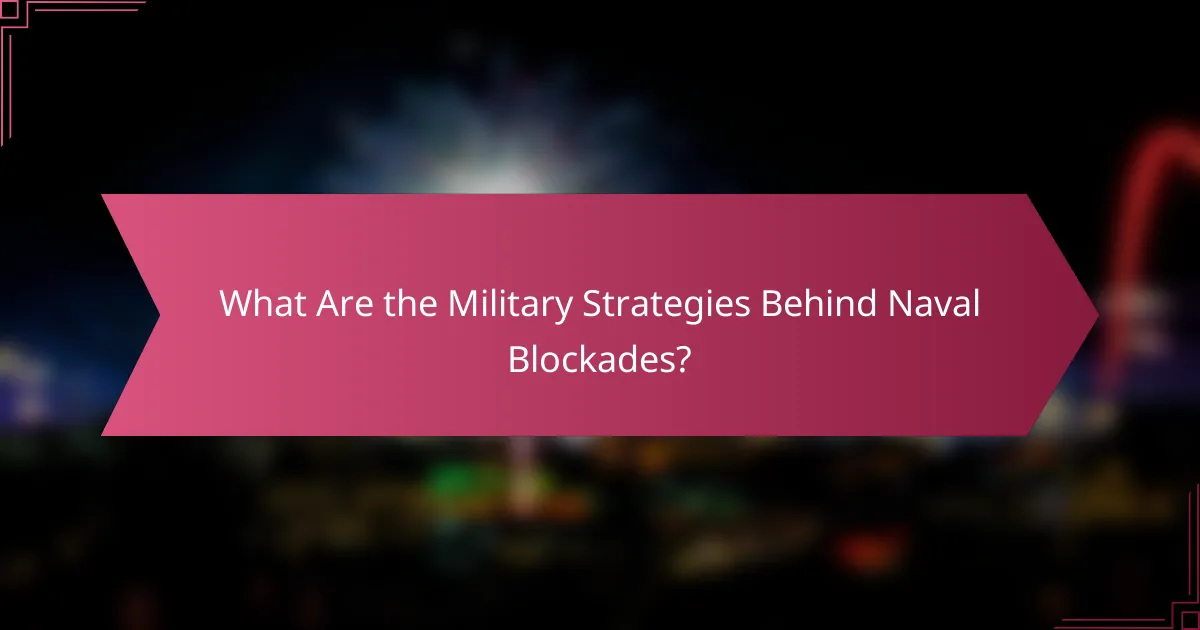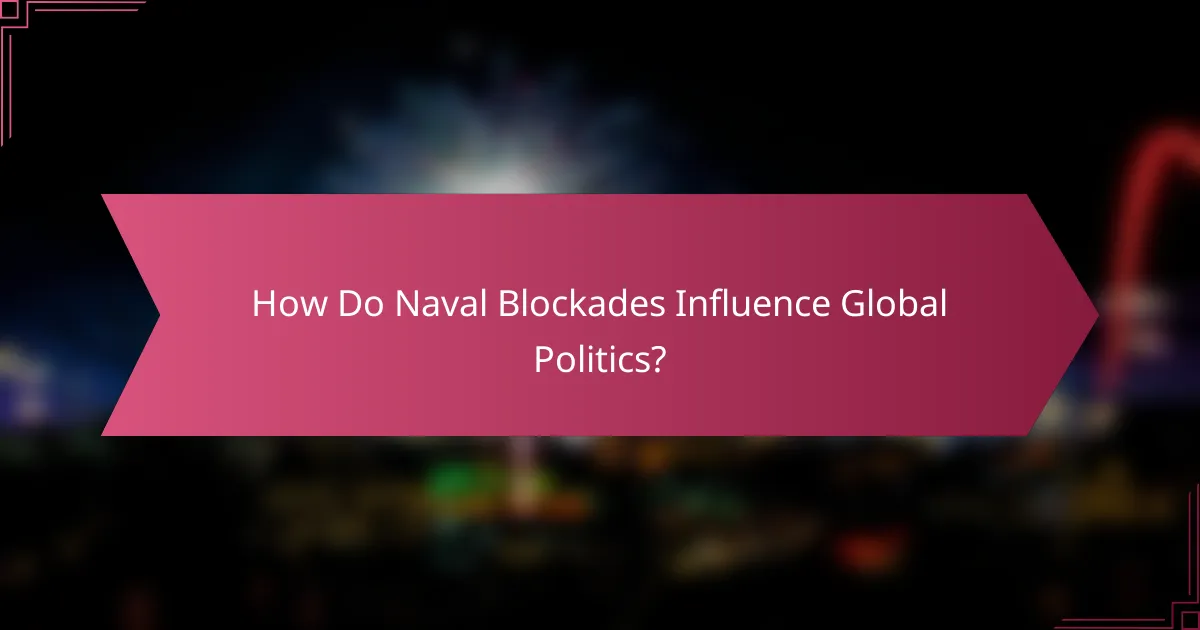Naval blockades play a crucial role in military strategy by disrupting the flow of goods and resources, thereby weakening an adversary’s economy and military capabilities. This tactic not only leads to economic instability and shortages but also shapes the political and military landscape of conflicts, influencing international relations and global trade dynamics. Understanding the multifaceted impacts of naval blockades is essential for analyzing their effectiveness and long-term consequences in warfare.

How Do Naval Blockades Affect Economies?
Naval blockades significantly disrupt economies by restricting the flow of goods and services across maritime routes. This restriction can lead to shortages, increased prices, and broader economic instability for the nations involved.
Disruption of Trade Routes
Naval blockades create immediate disruptions in trade routes, halting the movement of essential goods. This can lead to delays in supply chains, affecting industries reliant on timely deliveries, such as manufacturing and retail.
For example, a blockade can prevent oil tankers from reaching their destinations, causing energy shortages and impacting transportation sectors. Countries may need to seek alternative routes, which can be more costly and time-consuming.
Impact on Commodity Prices
When trade routes are disrupted, commodity prices often rise due to scarcity. This inflation can affect everything from food to raw materials, placing additional financial strain on consumers and businesses alike.
For instance, if a blockade limits the supply of agricultural products, prices for staples like wheat or rice may increase significantly, impacting food security in affected regions.
Effects on National Economies
National economies can suffer severe consequences from naval blockades, including reduced GDP growth and increased unemployment. Industries that rely heavily on imports or exports may face significant downturns, leading to job losses.
Countries may also experience a decline in foreign investment, as investors become wary of unstable conditions. This can further exacerbate economic challenges and hinder recovery efforts.
Long-term Economic Consequences
The long-term economic consequences of naval blockades can be profound, often leading to structural changes in economies. Nations may shift their trade partnerships or invest in domestic production to mitigate future risks.
Over time, this can result in a reconfiguration of global trade networks, with countries seeking to diversify their sources and reduce dependence on vulnerable routes.
Case Study: The Cuban Missile Crisis
The Cuban Missile Crisis in 1962 serves as a notable example of a naval blockade’s economic impact. The U.S. imposed a naval blockade on Cuba to prevent the delivery of Soviet missiles, which led to significant economic strain on the island.
During the blockade, Cuba faced shortages of essential goods, leading to increased prices and a decline in living standards. The crisis highlighted how military strategies can have immediate and lasting effects on a nation’s economy, altering trade dynamics in the region for years to come.

What Are the Military Strategies Behind Naval Blockades?
Naval blockades are strategic military operations aimed at restricting the movement of goods and resources to and from a specific area, often targeting an enemy’s supply lines. They serve to weaken an opponent’s economy and military capabilities while protecting one’s own interests.
Objectives of Naval Blockades
The primary objectives of naval blockades include disrupting enemy supply chains, limiting access to critical resources, and exerting economic pressure. By controlling maritime routes, a nation can effectively isolate its adversary, making it difficult for them to sustain military operations or maintain civilian morale.
Additionally, blockades can serve as a deterrent, signaling to potential aggressors that certain actions will provoke a strong military response. This strategic positioning can help maintain peace or influence negotiations without direct confrontation.
Types of Naval Blockades
Naval blockades can be categorized into two main types: total and partial blockades. A total blockade aims to completely cut off all maritime traffic to and from a target area, while a partial blockade allows limited access for specific goods or vessels, often under strict regulations.
Another classification is based on the enforcement method, which can be either active or passive. Active blockades involve the use of naval forces to intercept and search vessels, while passive blockades rely on the threat of force to deter shipping without direct engagement.
Historical Examples of Successful Blockades
One notable example is the British naval blockade during World War I, which significantly restricted supplies to Germany, contributing to its eventual defeat. The blockade was instrumental in limiting food and raw materials, leading to widespread shortages and social unrest within Germany.
Another example is the Cuban Missile Crisis in 1962, where the United States enforced a naval blockade to prevent the Soviet Union from delivering missiles to Cuba. This action effectively escalated diplomatic tensions while avoiding direct military conflict, showcasing the strategic use of blockades in international relations.

What Are the Key Outcomes of Naval Blockades?
Naval blockades can lead to significant political, military, and economic outcomes that shape the dynamics of conflict and international relations. These outcomes often influence the strategies of nations involved and can have lasting effects on global trade and security.
Political Outcomes
Naval blockades can alter political landscapes by forcing nations to negotiate or concede to demands. They often serve as a tool for demonstrating military strength and can lead to shifts in alliances or public opinion. For instance, a successful blockade may bolster a government’s standing domestically while isolating its adversaries internationally.
Additionally, prolonged blockades can lead to humanitarian crises, prompting international bodies to intervene or impose sanctions, which can further complicate diplomatic relations. The political ramifications can extend beyond immediate conflicts, influencing future engagements and treaties.
Military Outcomes
From a military perspective, blockades can significantly weaken an opponent’s operational capabilities by restricting access to essential supplies and reinforcements. This can lead to a strategic advantage for the blockading force, allowing them to dictate the terms of engagement. For example, during World War I, the British blockade of Germany severely limited its resources and contributed to its eventual defeat.
Moreover, the effectiveness of a blockade often depends on the blockading nation’s naval power and the ability to enforce the blockade against potential breaches. This can lead to increased military expenditures and a focus on naval capabilities in future defense strategies.
Economic Outcomes
The economic impact of naval blockades can be profound, often leading to shortages of goods and inflation in the affected region. Blockades can disrupt trade routes, causing significant losses in revenue for both the blockaded nation and its trading partners. For instance, during the Cuban Missile Crisis, the U.S. blockade led to economic strain on Cuba, affecting its imports and exports.
Additionally, the long-term economic consequences may include shifts in trade patterns and the emergence of black markets. Nations may seek alternative suppliers or routes, which can alter global trade dynamics and lead to increased costs for consumers. Understanding these economic ramifications is crucial for policymakers when considering the implementation of a blockade.

What Criteria Determine the Effectiveness of a Naval Blockade?
The effectiveness of a naval blockade is primarily determined by geographic considerations, technological capabilities, and adherence to international law. Each of these factors plays a critical role in shaping the blockade’s impact on the targeted nation and its economy.
Geographic Considerations
Geography significantly influences the success of a naval blockade. Key factors include the location of the blockade, proximity to the target nation’s ports, and the natural features of the coastline. For instance, a blockade positioned near narrow straits or chokepoints can be more effective in restricting maritime traffic.
Additionally, the size and depth of the waterway can affect the types of vessels that can navigate through. Shallow waters may limit the size of ships, while deeper channels can accommodate larger vessels, impacting the blockade’s overall effectiveness.
Technological Capabilities
Technological advancements play a crucial role in the implementation and effectiveness of naval blockades. Modern naval forces utilize advanced surveillance systems, such as satellites and drones, to monitor maritime traffic and detect potential breaches. This technology allows for more precise enforcement of the blockade.
Moreover, the types of vessels employed in the blockade, including submarines and aircraft carriers, can enhance operational capabilities. The integration of sophisticated weaponry and communication systems further improves the blockade’s strategic effectiveness.
International Law and Legitimacy
Adherence to international law is essential for the legitimacy of a naval blockade. Blockades must comply with the principles outlined in the United Nations Convention on the Law of the Sea (UNCLOS) to be considered lawful. This includes ensuring that the blockade does not cause excessive harm to the civilian population of the targeted nation.
Failure to adhere to these legal standards can lead to international condemnation and potential repercussions from other nations. Therefore, understanding and navigating the legal framework is vital for the successful implementation of a naval blockade.

How Do Naval Blockades Influence Global Politics?
Naval blockades significantly impact global politics by restricting the movement of goods and resources, which can lead to economic strain and diplomatic tensions. They serve as a strategic tool for nations to exert pressure on adversaries, often influencing negotiations and alliances.
Impact on Diplomatic Relations
Naval blockades can strain diplomatic relations between nations, as they often provoke strong responses from affected countries. When a nation imposes a blockade, it may be viewed as an act of aggression, leading to increased hostility and potential military confrontations.
For example, during the Cuban Missile Crisis, the U.S. established a naval blockade against Cuba, which heightened tensions with the Soviet Union. Such actions can either isolate the targeted nation or galvanize international support against the blockading nation, depending on the context and perceived legitimacy of the blockade.
Countries affected by blockades may seek to rally allies for support, leading to shifts in global alliances. This can result in long-term changes in diplomatic relations, as nations reassess their partnerships and strategies in response to the blockade’s implications.
